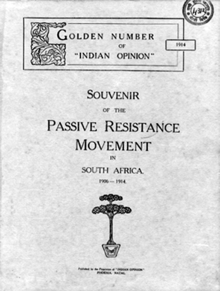Indian Opinion
The Indian Opinion was a newspaper established by Indian leader Mohandas Karamchand Gandhi. The publication was an important tool for the political movement led by Gandhi and the Natal Indian Congress to fight racial discrimination and win civil rights for the Indian immigrant community in South Africa. It existed between 1904 and 1915.[1]

History
Through the 19th century Indians were brought to South Africa as indentured labour by the authorities of the British Empire, which governed both South Africa and India. Alongside various multi-ethnic communities, the Indian community suffered from significant political, economic and social discrimination, administered by the system of apartheid. In the aftermath of the Boer War, the government of General Jan Smuts introduced significant restrictions on the civil rights of the Indian immigrant community, giving the police power to warrantless search, seizures and arrests. All Indians were required to carry identification and registration cards at all times. Working as a lawyer in the Natal province, Gandhi organized the publication in 1904 with the aim of educating European communities in South Africa about Indian needs and issues.
With the support of the Natal Indian Congress, his clients and other notable Indians, Gandhi assembled a small staff and printing press. Madanjit Viyavaharik, the owner of the International Printing Press and The first issue was prepared through 4 June and 5 June, and released on 6 June 1903. The newspaper was published in Gujarati, Hindi, Tamil and English. Mansukhlal Nazar, the secretary of the Natal Congress served as its editor and a key organiser. In 1904, Gandhi relocated the publishing office to his settlement in Phoenix, located close to Durban. At Phoenix, the press workers were governed by a new work ethic - they would all have a share in the land, in the profits if there were any, they would grow crops to sustain themselves and they would work jointly to produce Indian Opinion. The newspaper's editors included Hebert Kitchin, Henry Polak, Albert West, Manilal Gandhi, who was the paper's longest serving editor (for 36 years), and Sushila Gandhi, wife of Manilal who took over after his death.[2] All but one of its editors spent some time in jail.[3]
Reports
The Indian Opinion began by adopting a very moderate tone, reiterating its faith in British law and seeking not to provoke the hostility of British officials. However, the Indian Opinion especially highlighted the poor conditions under which indentured labourers worked. Editorials tackled the discrimination and harsh conditions prevalent in the agricultural estates where indentured Indians were employed. Cases of harsh treatment by employers were publicized and the astoundingly high rate of suicide amongst Indians was pointed out. A campaign to end the system was launched and editor Henry Polak, a friend of Gandhi's, went to India to mobilise support. From 1906 onwards it became a vehicle for challenging state laws and urging defiance of these when these were clearly unjust. This tradition began during the satyagraha campaign between 1906 and 1913 which began because of attempts to impose passes on Indians in the Transvaal. The paper played a fundamental role on defeating the registration drive of officials. Its pages paid tribute to local resisters and Brian Gabriel, one of Natal's earliest Indian photographers, provided visual coverage.
Legacy
The Indian Opinion was a means of bringing news about Indians in the colonies before the public in India. The pages of Indian Opinion provide a valuable historical record of the disabilities that Indians suffered under. It also provides an invaluable record of the political life of the Indian community. Gandhi's experience with the publication and the political struggle in South Africa proved a major experience for him that helped him in his work for the Indian independence movement. He commented "Satyagraha would have been impossible without Indian Opinion."
In India, he would publish Young India, Harijan, and Navjivan. Indian Opinion continued to publish for many decades and played a significant role in the wider civil rights struggle of South Africa. But it also suffered from not being a commercial enterprise but rather a publication committed to serving social causes.
See also
References
- "History of Mass Media" (PDF). University of Calicut. Retrieved 16 October 2016.
- "Sushila Gandhi". South African History Online. Retrieved 20 May 2012.
- Dhupelia-Mesthrie, Uma. "The Significance of Indian Opinion". Retrieved 20 May 2012.
- M. K. Gandhi. An Autobiography or the Story of My Experiments with Truth (1929)
- Isabel Hofmeyr, Gandhi’s Printing Press: Experiments in Slow Reading. Harvard University Press, Cambridge, Mass., 2013.
External links
- Archives of Indian Opinion 1903-1914
- Archives of Indian Opinion 1950-1961
- Archives of Indian Opinion 1903
- Gandhipoetics.com A site containing an anthology and an analysis of the Satyagraha poetry found in the Indian Opinion between 1909 and 1911.